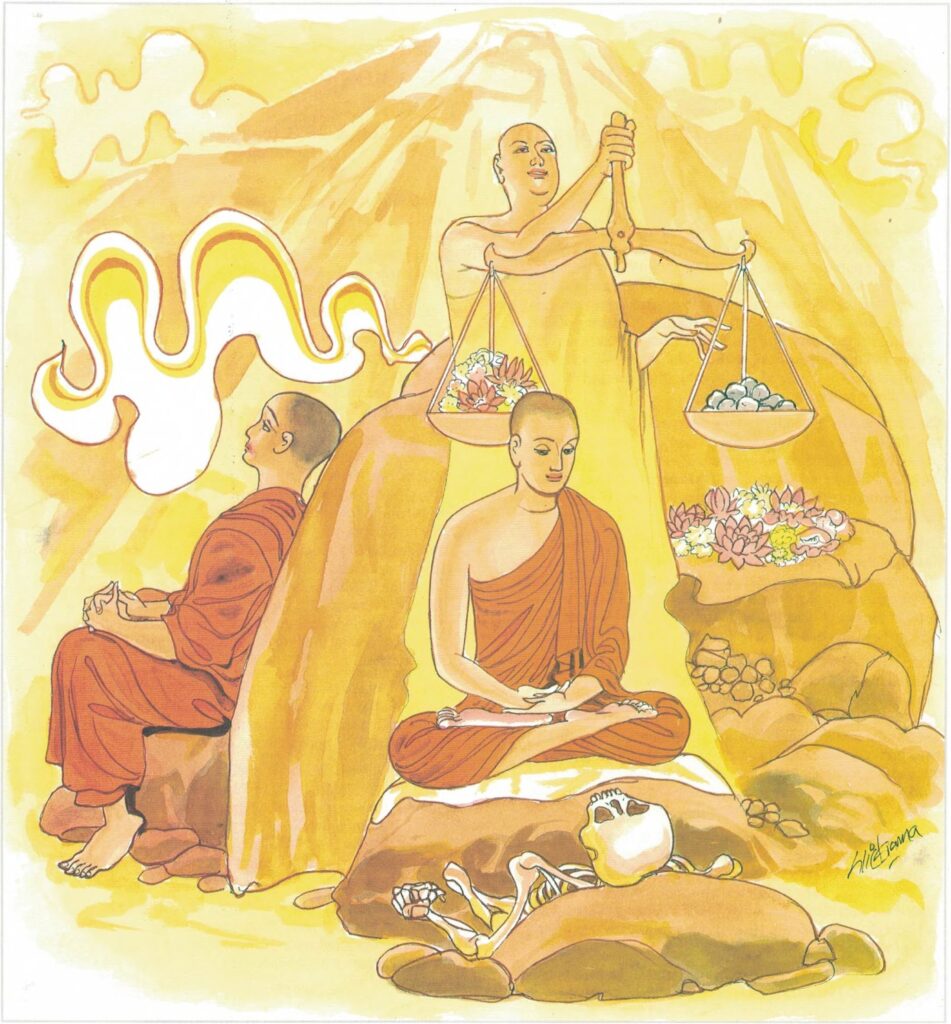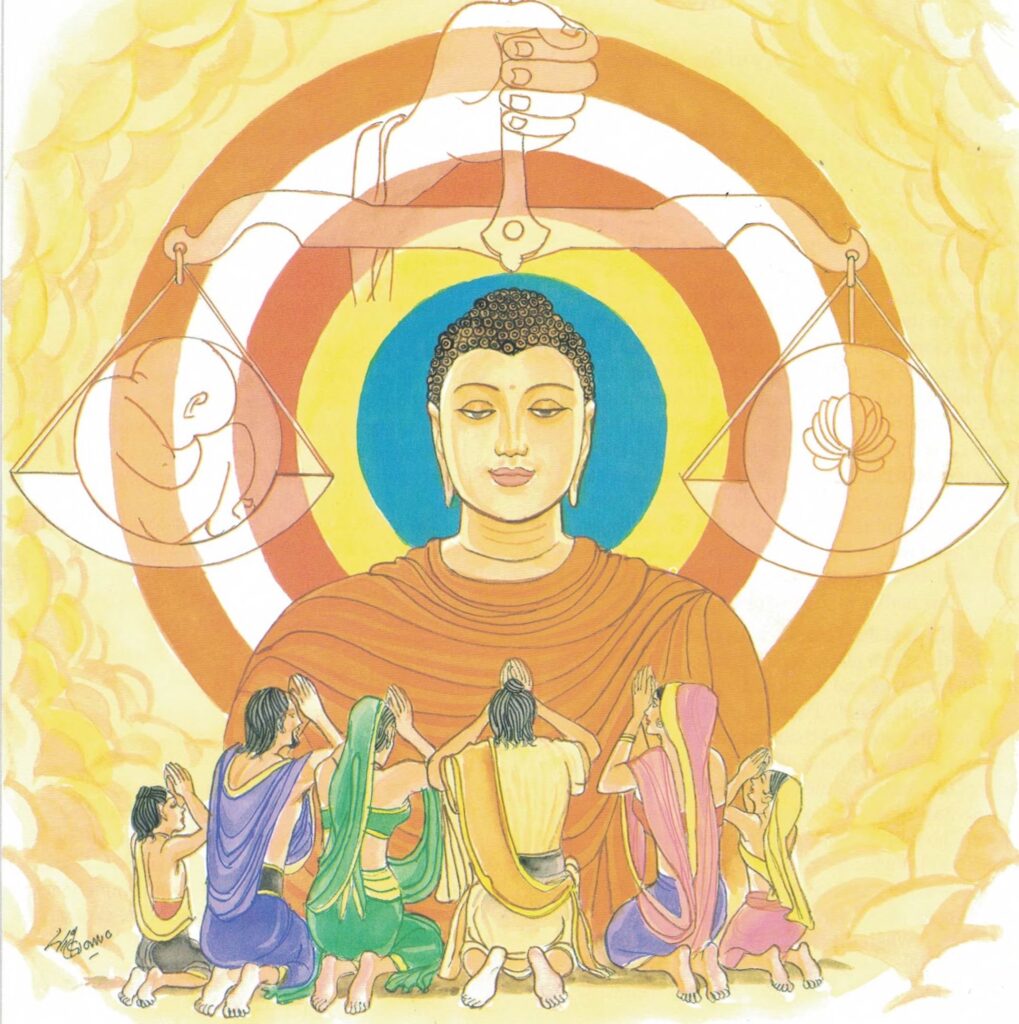Pali text, illustration and English translation of Dhammapada verse 268-269:
na monena muni hoti mūḷharūpo aviddasu |
yo ca tulaṃ’va paggayha varamādāya paṇḍito || 268 ||
pāpāni parivajjeti sa manī tena so muni |
yo munāti ubho loke muni tena pavuccati || 269 ||
268. By silence one is not a sage if confused and foolish, but one who’s wise, as if with scales weighs, adopts what’s good.
269. Shunning evils utterly one is a sage, by that a sage. Whoever both worlds knows for that one’s called a ‘Sage’.


The Story of the Followers of Non-Buddhist Doctrines
While residing at the Jetavana Monastery, the Buddha spoke these verses with reference to some non-Buddhist ascetics.
The story goes that whenever the heretics took a meal in a given place, they would say to their hosts, “May tranquillity be your portion, may happiness be your portion, may your years increase. In such and such a place there is mud, in such and such a place there are thorns; to such a place you should not go.” After this manner would they express their thanks and good wishes, and only after having so done, would they depart. But in the first period of enlightenment, before the saying of thanksgivings had been enjoined, the monks would depart from the refectory with never a word of thanksgiving to their hosts. At this the people were offended and said, “We hear words of thanksgiving and good wishes from the heretics, but the reverend monks depart in utter silence.” The monks reported this matter to the Buddha.
Said the Buddha, “Monks, henceforth in refectories and other such places render thanks according to your good pleasure and speak pleasantly to your hosts as you sit beside them.” Thus did the Buddha enjoin upon them the saying of thanksgivings, and they did according to his command. When the people heard the words of thanksgiving, they put forth the greater efforts, invited the monks to take meals in their houses, and went about bestowing abundant offerings upon them. Then were the heretics offended and said, “We are sages and keep silence, but the disciples of the Buddha deliver lengthy discourses in refectories and other such places.” When the Buddha heard their remarks, he said, “Monks, I do not call a man a sage merely because he keeps silence. For there are some men who say nothing because of ignorance, others because of lack of confidence, while still others are so niggardly that they seek to prevent others from learning anything of importance which they themselves know. Therefore, I say that a man is not called a sage merely because he keeps silence; rather is he called a sage because of suppression of evil.”
Explanatory Translation (Verse 268)
mūḷharūpo aviddasu monena munī na hoti
paṇḍito yo ca tulaṃ paggayha iva varaṃ ādāya
mūlharūpo [ādāya mūlharūpa]: possessing foolish ways; aviddasu: the ignorant one;monena: through the ritual of keeping silent only; munī na hoti: does not become a sage; paṇḍito [paṇḍita]: blessed with wisdom; yo ca: someone; tulaṃ paggayha iva: like a person holding scales; varaṃ ādāya: deciding what is noble
The ignorant person, possessing foolish ways and seemingly bewildered, may practice silence–the austerity of the munis. But this does not make him a sage. But the wise person, like someone holding scales, weighs good and bad and selects what is noble.
Explanatory Translation (Verse 269)
pāpāni parivajjeti, sa munī. so tena munī,
yo ubho loke munāti, tena munī pavuccati.
pāpāni parivajjeti: (He) gets rid of evil; sa: in consequence; munī so: is described as muni (the sage): tena: therefore; munī: that sage; yo: he who; ubho loke: both worlds (internal and external); munāti: through his wisdom comprehends; tena: because of this; munī pavuccati: is described as muni (the sage)
Weighing what is right and wrong, he shuns evil. For this he is a sage (muni). He is capable of weighing both worlds through his sagely wisdom.
Commentary and exegetical material (Verse 268-269)
Heretics: On many occasions, the hermits spread adverse rumours about the Buddha and His Teachings. These stanzas, too, were occasioned by such an attempt by the heretics to mar the reputation of the Buddha. Some attempts by heretics to sully the character of the Buddha took a gruesome guise. Here are some such attempts.
When, at one time, the Buddha was dwelling at the Jītavana Monastery, the heretics were greatly worried about their own future. For the Buddha and the fraternity of monks were highly respected, honoured, looked after and obeyed by the people, and they were provided with meals, robes, seats, medicines and other requisites. On the other hand, the heretics were not so respected, honoured, looked after and listened to, and they did not receive meals, robes, seats, medicines and other requisites.
As the heretics were unable to face this situation, they went to a female wandering ascetic, who was known as Sundarī (beauty) due to her bodily beauty. She was young in age, and bad in character. It was the plan of the heretics that they would attack the character and reputation of the Buddha and the monks through this female ascetic.
They asked her, “Sister, can you do some favour for your relations?” “What do you want me to do? There is nothing I will not do for you. I am prepared even to sacrifice my life for the sake of my relations,” assured the female ascetic.
The heretics asked her to go at once to the Jetavana, and keep on going there regularly. Accordingly, she decked herself well and began to go to the Jetavana at the time when people were returning from the Monastery after listening to the discourses of the Buddha. When she was asked by the people where she was going to, she said that she was going to spend the night in the Fragrant Chamber with the Buddha. She would actually spend the night in a hermitage of the heretics, and early in the morning would come to the city passing the Jetavana Monastery. When people asked her where she was coming from, she said that she was returning home after spending the night in the Fragrant Chamber of the Buddha.
The heretics, one day, got this female ascetic killed and buried in a hole in the ditch of the Jītavana Monastery by some hirelings, and went and complained to King Pasenadi that Sundarī was missing.
“Where do you suspect her to be?” asked the King. “In the Jetavana Monastery,” they replied promptly.
The king gave them permission to search where they wished. Finding the body near the Jetavana Monastery, they carried it to the palace. Then they said to the king, “O’ King, the followers of the Buddha have killed this Paribbājikā and have thrown away her body in the rubbish heap near the Jetavana Monastery to cover up the misdeed of their Teacher.” To them, the king replied, “In that case, you may go around the town and proclaim the fact.” So they went around the town carrying the dead body of Sundarī, shouting, “Look at what the followers of the Buddha have done; see how they have tried to cover up the misdeed of Gotama!” The procession then returned to the palace.
The king next ordered his men to further investigate the murder of Sundarī. On investigation, they found out that Sundarī had died at the hands of some drunkards. So they were brought to the king. When questioned, the drunkards disclosed that they were hired by the ascetics to kill Sundarī and put her body near the Jetavana Monastery. The king then sent for the non-Buddhist ascetics, and they finally confessed their role in the murder of Sundarī. The king then ordered them to go round the town and confess their guilt to the people.
So they went round the town saying, ‘We are the ones who killed Sundarī. We have falsely accused the disciples of Gotama just to bring disgrace on Gotama. The disciples of Gotama are innocent, only we are guilty of the crime.” As a result of this episode, respect for the Buddha was very much enhanced, to his glory.